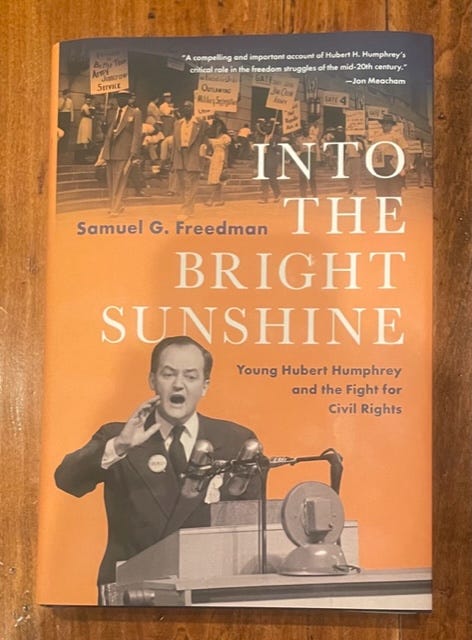“I think Tony’s friend might just become Vice President.”
I heard Grandpa -- Mom’s dad, Mense -- predict this in the spring of 1964. Dear Grandpa was a staunch Republican and my extended family was NOT well connected, except knowing many people in a rural community straddling the Iowa-Minnesota state line. Familiarity was rooted in generations living for decades in the same rural community, where Grandpa and his oldest sister, Clara (Tony’s mother) grew up, where I came of age and now live.
Tony attended the University of Minnesota, where he met a classmate named Hubert. Their friendship was longstanding. Several years after graduation, when Hubert and his wife Muriel needed a babysitter, they reached out to Tony’s mother, my great-aunt Clara, then a 60-year-old widow living in Minneapolis. As it turns out, Clara often babysat the Humphrey children.
Several weeks ago, a friend gifted me “Into the Bright Sunshine” a book by Samuel Freedman. It focuses on Hubert Humphrey’s civil rights advocacy, the crystalizing moment coming 75 years ago, his speech before the 1948 Democratic Convention. “To those who say we’re rushing this issue of civil rights, I say we’re 172 years late. … the time has arrived to get out of the shadow of states’ rights and to walk forthrightly into the bright sunshine of human rights.”
This speech was a significant turning point for Humphrey, for the Democratic Party, eventually, for the entire country. Freedman’s volume has given rise to a current Humphrey boomlet, consisting largely of reviews and conversations about the book in major news outlets. (If this column were a review, I’d give “Sunshine” five stars on a five-star scale, “… a brilliant book by a gifted writer, blah, blah, blah”.)
Another recent Humphrey citation involves the building bearing his name in Washington, DC, that houses the Department of Health & Human Services (HHS). This brutalist structure was the first federal building named for a living person; two-plus months after opening in November, 1977, Humphrey died. Last month, a Washington Post article noted a social media debate about it being one of the Capital’s ugliest buildings. Designed by noted architect Marcel Breuer, the Humphrey HHS Building consists of precast concrete panels with recessed windows, producing “a monumental, modern box-like building” (from the HHS website).
Weakened by cancer and treatments, Humphrey spoke at the building’s dedication. “Under this roof … new and better efforts to promote human welfare will be developed and administered, mov(ing) us closer to our goal of insuring to every child the opportunity to grow and develop to his or her fullest potential, to every adult a life of industry and dignity, and to every older American, a twilight of serenity and independence.”
This was a slight variation of a theme Humphrey articulated at the 1976 Democratic National Convention. “The moral test of government is the way it treats three groups of its citizens. First, those in the dawn of life -- our children. Second, those in the shadows of life -- our needy, our sick, our handicapped. Third, those in the twilight of life -- our elderly.”
Samuel Freedman discussed his motivation for writing about Humphrey: “Lyndon Johnson's reputation has been recentered. Most Americans who care can hold Johnson's catastrophic decision about Vietnam in one hand and his remarkable record of domestic legislation in the other. For reasons that baffled the heck out of me, this had not happened to Hubert Humphrey. One reason I undertook this book was to give a 360-degree picture of who (Humphrey) was… a sense of how unspeakably courageous it was for him to take on civil rights at this time.”
Grandpa was about my age when he accurately predicted his nephew’s friend becoming Vice President. I close with two predictions of my own: In due course, brutalist architecture will become more fashionable again. And eventually, Hubert Humphrey will receive much-deserved credit for calling national attention to civil rights and the ongoing test of government. Pretty safe prognostications, methinks; only time will tell.
***
I’m part of the Iowa Writers’ Collaborative, members listed below:





Thanks for raising awareness of this book that focuses on a less well-known dimension of the man!